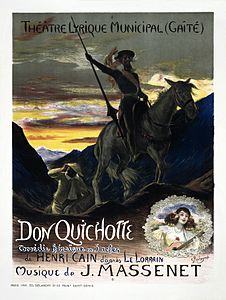Georges Rochegrosse (original) (raw)
From Wikipedia, the free encyclopedia
French painter (1859–1938)
| Georges Rochegrosse | |
|---|---|
 Georges Rochegrosse. Self-portrait, 1908 Georges Rochegrosse. Self-portrait, 1908 |
|
| Born | Georges-Antoine-Marie Rochegrosse2 August 1859Versailles, France |
| Died | 11 July 1938(1938-07-11) (aged 78)El Biar, Algeria |
| Resting place | Montparnasse Cemetery |
| Education | Jules Joseph Lefebvre and Gustave Boulanger in Paris |
| Known for | Painter, illustrator, poster artist, and etcher |
| Movement | Orientalist |
| Spouse | Marie Leblond |
| Awards | Officer of the Legion of Honor (1892) |
Georges Antoine Rochegrosse (French: [ʒɔʁʒ ɑ̃twan ʁɔʃɡʁɔs]; 2 August 1859 – 11 July 1938) was a French historical and decorative painter.
He was born in Versailles and studied in Paris with Jules Joseph Lefebvre and Gustave Clarence Rodolphe Boulanger.[1] His themes are generally historical, and he treated them on a colossal scale and in an emotional naturalistic style, with a distinct revelling in horrible subjects and details.
He made his Paris Salon début in 1882 with Vitellius traîné dans les rues de Rome par la populace (Vitellius dragged through the streets of Rome by the people) (1882; Sens). He followed this the year afterwards with Andromaque (1882–83; Musée des Beaux-Arts de Rouen), which won that year's prestigious Prix du Salon. There followed La Jacquerie (1885; Untraced), La mort de Babylone (The fall of Babylon) (1891; Untraced), The death of the Emperor Geta (1899; Musée de Picardie, Amiens), and Barbarian ambassadors at the Court of Justinian (1907; Untraced), all of which exemplify his strong and spirited but sensational and often brutal painting. In quite another style and beautiful in colour is his Le Chevalier aux Fleurs (The Knight of Flowers) (1894; Musée d’Orsay, Paris; RF 898).
He was elected an Officer of the Legion of Honour in 1892 and received the Medal of Honour in 1906 for The Red Delight. Rochegrosse also illustrated several books. His great love, his wife Marie Rochegrosse (née Leblond), had died in 1920. He lived his final years in El Biar, in Algeria, where he died. He is buried in Paris, in the Montparnasse Cemetery, near the poet Theodore de Banville, his stepfather.
Paintings

Greek troops rushing forward at the Battle of Marathon
The Knight of the Flowers
Marie Rochegrosse in the Dining Room
Portrait of Sarah Bernhardt
in Costume
Vitellius
Dragged Through the Streets of Rome by the Populace
Posters


Phototype reproduction of Rochegrosse's art used in the poster for the première of Claude Debussy and Maurice Maeterlinck's Pelléas et Mélisande (1902)

Poster for the Paris première of Pénélope (1913) Gilman, D. C.; Peck, H. T.; Colby, F. M., eds. (1905). "Rochegrosse". New International Encyclopedia (1st ed.). New York: Dodd, Mead.
Gilman, D. C.; Peck, H. T.; Colby, F. M., eds. (1905). "Rochegrosse". New International Encyclopedia (1st ed.). New York: Dodd, Mead.
- ^ Waller, S. (ed.), Foreign Artists and Communities in Modern Paris, 1870–1914: Strangers in Paradise, Routledge, 2017, p. 119.
 Media related to Georges-Antoine Rochegrosse at Wikimedia Commons
Media related to Georges-Antoine Rochegrosse at Wikimedia Commons